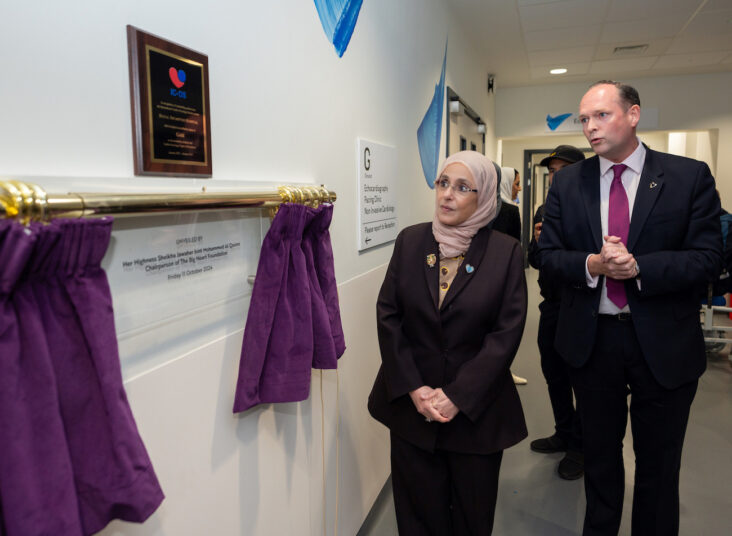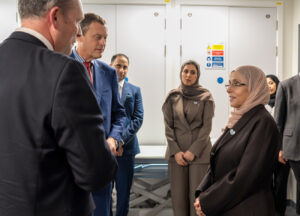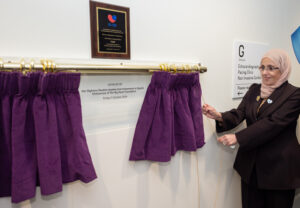Jawaher Al Qasimi Launches A Cardio-Oncology Centre Of Excellence In Royal Brompton London Set To Transform Lives Of 10 Million Beneficiaries Worldwide

Marking a significant milestone in global health collaboration, Her Highness Sheikha Jawaher bint Mohammed Al Qasimi, Wife of His Highness the Ruler of Sharjah and Chairperson of The Big Heart Foundation (TBHF), has laid the foundation stone for the Virtual Cardio-Oncology Centre of Excellence at Royal Brompton Hospital in London, United Kingdom.
This pioneering initiative, undertaken by the esteemed Royal Brompton Hospital – a world leader in heart and lung diseases – is being supported by TBHF – a global humanitarian foundation based in Sharjah – with a substantial contribution of 1 million British pounds.
This came during Her Highness’s visit to Royal Brompton Hospital, leading a delegation from The Big Heart Foundation, accompanied by Dr Abdulaziz Al Muhairi, Chairman of the Sharjah Health Authority. Her Highness unveiled the foundation stone of the programme and was welcomed by the hospital’s management including Dr. Alexander Lyon, Senior Lecturer and Honorary Consultant in Cardiology at Royal Brompton Hospital and Director of Cardio-Oncology Centre of Excellence, , and the programme’s specialised team, from whom she was briefed on the progress of the work and the initial research findings.
Programme’s findings to impact 10 million people worldwide
Poised to impact approximately 10 million beneficiaries across the globe, , the programme is the first of its kind in the UK and the most extensive in Europe. Aimed at boosting and enriching targeted scientific research and analysis of the long-term effects of cancer treatments on the heart and blood vessels, the programme will provide essential insights into mitigating the risks posed by these treatments and the development of new approaches for its treatment and management, and ultimately enhance the cardiovascular health of cancer patients. Importantly, its findings will be shared with researchers, medical institutions and hospitals globally, ensuring that the knowledge gained benefits patients facing both cancer and cardiovascular disease worldwide.
By addressing one of the most pressing global challenges in cancer treatment, this programme represents a critical advancement.
While cancer therapies have significantly improved survival rates, the prevalence of heart muscle diseases as a side effect remains alarmingly high. Recent studies indicate that 10% of cancer patients succumb to cardiovascular diseases, while an even greater number face chronic heart conditions as a result of their cancer treatments. This programme’s focus on reducing such risks is a vital step forward in advancing global health outcomes, ensuring that the fight against cancer does not compromise long-term cardiovascular health.
Leveraging science & technology to create a robust global healthcare system for all
Her Highness Sheikha Jawaher Al Qasimi underscored that every scientific discovery and technological advancement must be leveraged to alleviate the suffering of individuals impacted by cancer, cardiovascular diseases, and other serious health conditions. She emphasised that all collaborative efforts, both regionally and globally, must place the well-being of humanity at the forefront, prioritising health and stability.
The Cardio-Oncology Centre of Excellence is going to be a vital platform for researchers, healthcare institutions and families whose lives have been affected by these life-threatening diseases and their far-reaching physical, emotional and social consequences.
Her Highness stated, “Today, science has provided us with unprecedented tools, offering new avenues of hope and tangible progress in public health. What was once a distant aspiration is now within our reach. We are eager to see the innovative solutions that will emerge from the dedication of these brilliant minds, and more importantly, we look forward to witnessing the restored health of patients and the renewed sense of assurance among their families.”
Her Highness expressed, “I am proud today as we position the name of Sharjah and the United Arab Emirates in support of launching the most important medical research programme for cardiovascular health in cancer patients. I am also pleased that this responsibility is in the hands of a compassionate and professional team from around the world.”
Programme contributes to the establishment of the UK’s first biobank
During the visit, Her Highness toured the hospital’s facilities and received a detailed briefing on the stages of the Cardio-Oncology Centre of Excellence, the advanced technologies used, and the services the programme’s outcomes will offer to doctors and patients. Her Highness also met with several patients suffering from heart conditions following cancer treatments. Her Highness also hosted a meeting with the programme’s medical and research teams, she commended their essential contributions in tackling some of the most aggressive health challenges of our time. She affirmed that every advancement they achieve has the potential to transform the lives of millions across the globe, underscoring the critical importance of their work.
The programme also aims to build networks of cooperation with research and academic institutions worldwide to enhance research methodologies and credibility of results. It will also establish a highly specialised clinical research group to disseminate the findings and maximise their benefits, while developing artificial intelligence algorithms for diagnosis, care, prediction and prevention of cardiotoxicity.
The programme also contributes to the establishment of the UK’s first biobank to store essential information about the disease, creating a global patient registry network in collaboration with international centres and organisations, and developing applications that support the programme’s goals. In addition, it introduces training programmes for doctors and specialists alike.
Royal Brompton Hospital is one of the largest specialised centres for heart and lung diseases in the UK, and among the largest in Europe and globally. The hospital primarily focuses on researching lung diseases, which are heavily impacted by cancer treatment-related illnesses.



